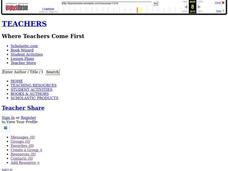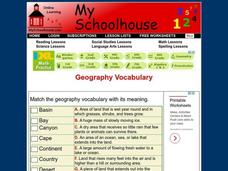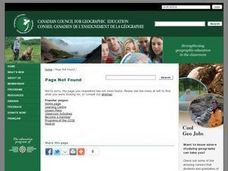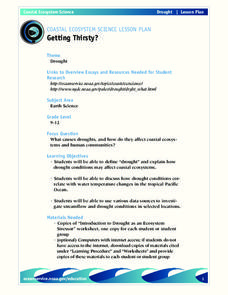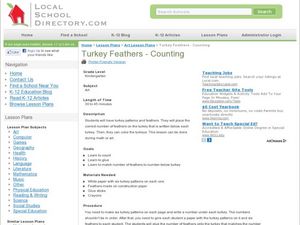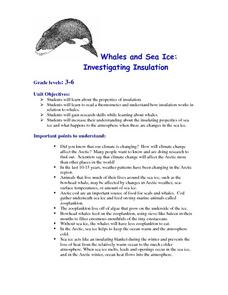K5 Learning
Sharks
"Dun dun... dun dun." A shark! After second graders read a four-paragraph passage about sharks, they respond to four reading comprehension questions that use the text as a basis for the answers.
National Wildlife Federation
Penguin Fun Facts
What's black and white and can dive up to 1,800 feet under water? That's right, penguins! Learn this and many other amazing facts about these unique birds with this handy reference sheet.
Forest Foundation
The Web of Life
Producers, herbivores, carnivores, omnivores, decomposers. To begin a study of the forest ecosystem, learners examine the connections among the members of ecological communities.
Curated OER
Create a Habitat for an Animal
In this marine life learning exercise, students label the ocean animal and each part of its habitat. Students then draw one of the habitats including the animals and plants that live there.
Curated OER
Animal Habitats
Students study the word habitat and its meaning. They also identify that in order for something to be classified as a habitat there needs to be the proper shelter, food, water, and space.
Curated OER
Oceanography Class Quilt
Students create and observe a collage of oceanography topics that be placed on quilt tiles in a culmination art project to represent information learned.
Curated OER
Learning About Mammals
Students study the mammal classification and forms of them living in the United States. In this mammal study lesson, students read through orders of mammals that exist in the United States. Students also study the taxonomy of an eastern...
Curated OER
A Model Estuary
Young scholars assemble a poster of an estuary showing the five communities of animals and plants that inhabit the estuary. They research the concept of an estuary and find photographs or diagrams of various estuaries to identify and...
Curated OER
Starfish
Learners explore the concept of starfish. In this starfish lesson, students identify the parts of a starfish and how their body works. Learners create a starfish using paint and a cornmeal mixture. They then glue on Cheerios to...
Curated OER
The Intertidal Zone: Tide and How Creatures Survive
Students explore oceanography by completing science worksheets. In this tide pools instructional activity, students discuss the forces of the tide pools, the animals that live within them, and the impact they have on the rest of the...
Curated OER
Geography Vocabulary
In this identifying geographic terms and their definitions online interactive worksheet, students match the vocabulary words with their definitions. Students match 24 answers.
Curated OER
Journey To the Unkown
Students explore the ocean rift habitat off the Galapagos through an audio expedition, Internet research on deep sea animals, an explorer game and simulation of the exploration of the deep sea bottom. They focus on the actual NOAA...
Curated OER
Changing With the Tide
Students describe three different aspects or life forms of the salt marsh. They compare and contrast the low and high marsh. Students explain what happens in different areas of the marsh at low and high tide; and explain the roles...
Curated OER
Getting Thirsty?
Young scholars explore the concept of drought and its significance as a natural hazard. For this drought lesson plan, students complete 13 questions on an "Introduction to Drought as an Ecosystem Stressor" worksheet and discuss the...
Curated OER
Mollusks
In this mollusks worksheet, learners color several figures and label them with the correct parts. They complete 14 short answer questions related to mollusks.
Curated OER
Is This a House for Hermit Crab?
First graders identify text that uses sequence or other logical order. They identify and interpret how different plants and animals inhabit different kinds of environments and have external features that help them thrive in different...
Curated OER
Fish Count
In this science worksheet, students read about how scientists determine the total number of fish in a population. Students also participate in a related math activity.
Curated OER
Life Has A History
In this biology worksheet, students identify and match various classes of species found today. Then they explain why biodiversity exists today on earth and define evolution. Students also describe who a paleontologist is and what they do.
Curated OER
Habitats and Adaptations
Students research and describe the habitat and adaptations of a reef animal. After the student is assigned a habitat, they design and draw a cresture adapted to eat each food and to live in each habitat.
Curated OER
Myth-try Cards Activity
Students read creation myths to learn various cultural explanations for natural phenomena. They select sharks and write myths to explain physical structures, behaviors or roles in ecosystems. They research the animals to provide...
Curated OER
Coral Reefs
Students research an inhabitant of a Caribbean coral reef using a list of common organisms that live on or near it. Students then write a description of their organism and draw a picture or a 3-D model of it. Eventually they all work...
Curated OER
Food Web Mobile
Students explain the main concepts of food webs and food chains. They
describe the role of animals, plants, and other organisms in cycling energy and matter through a food web by creating mobiles. Lesson contains adaptations for all levels.
Curated OER
Turkey feathers- Counting
Students use turkey feathers to count. In this turkey feather counting instructional activity, students find the correct number of turkey feathers to correctly show the number.
Curated OER
Whales and Sea Ice: Investigating Insulation
Young scholars investigate the properties of insulation as it relates to whales and sea ice. They research whales and examine the atmospheric changes that occur when there are changes in sea ice.










